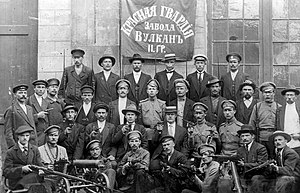Red October
| October Revolution | |||||||
|---|---|---|---|---|---|---|---|
| Part of the Russian Revolution, Revolutions of 1917–23 and the Russian Civil War | |||||||
 Red Guards at Vulkan factory in 1917 |
|||||||
|
|||||||
| Belligerents | |||||||
| Commanders and leaders | |||||||
|
|
|
||||||
| Strength | |||||||
| 10,000 red sailors, 20,000–30,000 red guard soldiers | 500–1,000 volunteer soldiers, 1,000 soldiers of women's battalion | ||||||
| Casualties and losses | |||||||
| Few wounded red guard soldiers | All deserted | ||||||
The October Revolution (Russian: Октя́брьская револю́ция, tr. Oktyabr'skaya revolyutsiya; IPA: [ɐkˈtʲabrʲskəjə rʲɪvɐˈlʲutsɨjə]), officially known in the Soviet literature as the Great October Socialist Revolution (Вели́кая Октя́брьская социалисти́ческая револю́ция, Velikaya Oktyabr'skaya sotsialističeskaya revolyutsiya), and commonly referred to as Red October, the October Uprising or the Bolshevik Revolution, was a seizure of state power instrumental in the larger Russian Revolution of 1917. It took place with an armed insurrection in Petrograd on 25 October (7 November, New Style) 1917.
It followed and capitalized on the February Revolution of the same year, which overthrew the and resulted in a provisional government after a transfer of power proclaimed by Grand Duke Michael, brother of Tsar Nicolas II, who declined to take power after the Tsar stepped down. During this time, urban workers began to organize into councils (Russian: Soviet) wherein revolutionaries criticized the provisional government and its actions. The October Revolution in Petrograd overthrew the provisional government and gave the power to the local soviets. The Bolshevik party was heavily supported by the soviets. After the Congress of Soviets, now the governing body, had its second session, it elected members of the Bolsheviks and other leftist groups such as the Left Socialist Revolutionaries to key positions within the new state of affairs. This immediately initiated the establishment of the Russian Socialist Federative Soviet Republic, the world's first self-proclaimed socialist state.
...
Wikipedia
